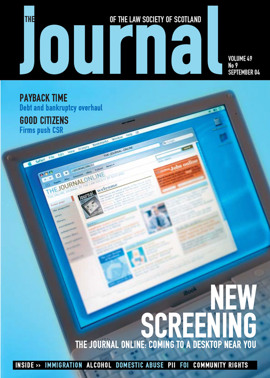Let the cameras speak
Lord Falconer’s announcement last month at the Edinburgh TV Festival that cameras are to be allowed into the English Court of Appeal on an experimental basis has been broadly welcomed by press and public alike. The normal citizen cannot afford to take time off work to sit in the law courts in The Strand each day to see how they operate in practice.
As a result only a few lawyers and an infinitesimally small section of the public have any idea how our courts work. This leads to a number of problems. Many people are very frightened of going to court as witnesses. Attacks by tabloid newspapers on seemingly strange, but perfectly explicable, court decisions serve to reduce the standing of the vast majority of excellent, hardworking lawyers involved in the court system. Realistic public access through the medium of television would serve the public well by educating and familiarising them with the judicial process.
Many members of the public still rely on American films for their supposed knowledge of the way the court works. I well remember a multiple-accused trial at Glasgow sheriff court where one of the punters chose to defend himself, according to a corruption of the Perry Mason process. This consisted of yelling “objection your honour” at poor old Sheriff Baird as a witness was trying to answer one of his questions. It was a very long trial.
In Scotland, since cameras were allowed into the courtroom in the summer of 1992, the model chosen has been bedevilled by the need for permissions from the judge, the accused, the lawyers, the jurors, the witnesses. Giving everyone a veto which they can exercise for up to 48 hours after filming has taken place, does not allow the Scottish public meaningful access to their courts.
There are a number of reasons for this. First, the few judges who want to throw their weight about and use harsh language will not allow cameras to film this. Lawyers who suspect that their forensic abilities fall short of a reasonable level of skill will not permit exposure of their shortcomings. But one of the main reasons why the principle that “justice should be done and be seen to be done” exists is to allow the public to see cases which are being messed up by judges or lawyers. The public can then demand a better standard of service. The Scottish rules on camera access sadly prevent that very useful public accountability taking place.
At the moment, the English experiment covers only the appellate courts. In Scotland, we have been allowed to film trials, although transmission is delayed until after the conclusion of the case and any appeal. It is clear from Lord Falconer’s comments that he is extremely worried about extending the English experiment to cover trial courts, apparently concerned that witnesses would not come forward, intimidated by being filmed for television.
Showing real events, particularly as they happen, is one of the greatest gifts television can give to the public in a democratic country. Today, no democracy would dream of setting up a parliament without building sophisticated television facilities into the debating chamber and committee rooms, so that the public could see what is being done in their name. Surely the same is true of the court system, which is every bit as much public property as parliament?
Sadly, in the modern world, we increasingly have to address ourselves to ways of dealing with terrorism. If the rule of law does not collapse under the weight of modern atrocities, those accused of terrorism and war crimes will continue to be tried in courtrooms. A large part of the process of justice being done in such cases is that they are heard in public. Today, that means being televised, whatever the wishes of the accused or the lawyers involved. Remember the Nüremberg Nazi trials; currently Milosevic in The Hague; the Guantanamo Bay detainees.
In Scotland, we have our own example of the Lockerbie trial, where the Libyan accused successfully prevented access by television to the courtroom. The lack of hard facts coming into homes throughout the world by the medium of TV meant it was possible for those who sought to make out that there was hardly any evidence against the two accused to be reasonably successful in their endeavour. Those of us who regularly attended the trial knew that this was not true. Had the trial been filmed, the truth would have been more widely known. So, too, the Scottish public, who paid many millions of pounds for the trial, and those throughout the world interested in seeing terrorists brought to justice, would have been well served.
Perhaps the new Scottish Parliament should think of legislating on increased access to Scottish courts. It would at least be a sign that we are truly a modern Scotland.
In this issue
- Profession's voice must be heard
- Let the cameras speak
- Vision on
- Forgive us our debts
- Written down
- DAS: the broader picture
- A lost message
- For the greater good
- Start your engines
- Are you covered?
- Opportunity knocks
- Rock bottom?
- BAILII looks for help
- On level ground
- Taking freedom seriously
- Taking out abuse
- Be ready for the options hearing
- Now it's collaborative
- Winning around a table
- Website reviews
- Scottish Solicitors' Discipline Tribunal
- Book reviews
- Beware all conveyancers!
- A-day looms closer






